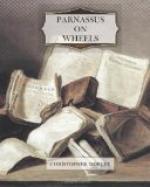Believe us, etc., etc.,
Decameron, Jones & Co.
I have since thought that “Paradise Lost” would have been a better title for that book. It was published in the autumn of 1907, and since that time our life has never been the same. By some mischance the book became the success of the season; it was widely commended as “a gospel of health and sanity” and Andrew received, in almost every mail, offers from publishers and magazine editors who wanted to get hold of his next book. It is almost incredible to what stratagems publishers will descend to influence an author. Andrew had written in “Paradise Regained” of the tramps who visit us, how quaint and appealing some of them are (let me add, how dirty), and how we never turn away any one who seems worthy. Would you believe that, in the spring after the book was published, a disreputable-looking vagabond with a knapsack, who turned up one day, blarneyed Andrew about his book and stayed overnight, announced himself at breakfast as a leading New York publisher? He had chosen this ruse in order to make Andrew’s acquaintance.
You can imagine that it didn’t take long for Andrew to become spoiled at this rate! The next year he suddenly disappeared, leaving only a note on the kitchen table, and tramped all over the state for six weeks collecting material for a new book. I had all I could do to keep him from going to New York to talk to editors and people of that sort. Envelopes of newspaper cuttings used to come to him, and he would pore over them when he ought to have been ploughing corn. Luckily the mail man comes along about the middle of the morning when Andrew is out in the fields, so I used to look over the letters before he saw them. After the second book ("Happiness and Hayseed” it was called) was printed, letters from publishers got so thick that I used to put them all in the stove before Andrew saw them—except those from the Decameron Jones people, which sometimes held checks. Literary folk used to turn up now and then to interview Andrew, but generally I managed to head them off.
But Andrew got to be less and less of a farmer and more and more of a literary man. He bought a typewriter. He would hang over the pigpen noting down adjectives for the sunset instead of mending the weather vane on the barn which took a slew so that the north wind came from the southwest. He hardly ever looked at the Sears Roebuck catalogues any more, and after Mr. Decameron came to visit us and suggested that Andrew write a book of country poems, the man became simply unbearable.




